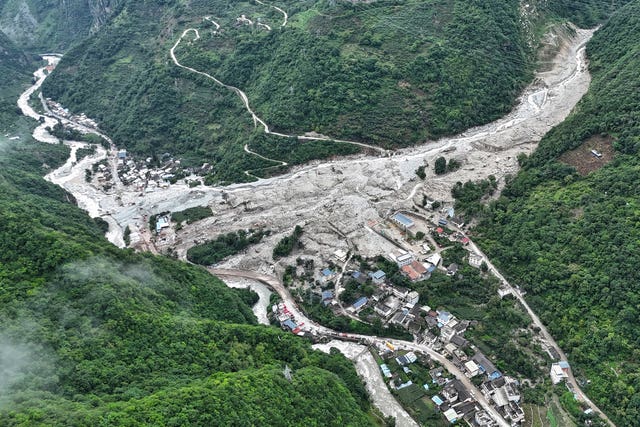More than 150 killed amid torrential rains in China
Landslides and flooding have caused widespread damage and deaths in and around China in the past two months.

Landslides and flooding have killed more than 150 people around China in the past two months as torrential rainstorms batter the region.
In the latest disaster, a flood and mudslide in a mountainous Tibetan area in Sichuan province on Saturday left eight people dead with 19 others still unaccounted for, state media said.
The early morning disaster destroyed homes and killed at least six people in the village of Ridi, the official Xinhua News Agency said.
Two more people died and eight are missing there after a bridge between two tunnels collapsed and four vehicles plummeted.

An annual government report on climate said last month that historical data shows the frequency of both extreme precipitation and heat has risen in China, according to state broadcaster CCTV.
A heat warning was in effect Monday in parts of eastern China, where temperatures were expected to top 40C in several cities including Nanjing, and 37C in nearby Shanghai on the coast.
There have been a series of deadly rainstorms since June.
Days of intense rain from the aftermath of Typhoon Gaemi, which weakened to a tropical storm after making landfall in China about 10 days ago, killed at least 48 people in Hunan province and left 35 others missing last week.
Authorities said the death toll from an earlier storm in July that knocked out a section of a bridge in Shaanxi province in the middle of the night had risen to 38 people, with another 24 still missing.

In mid-June, at least 47 died from flooding and mudslides after extremely heavy rain in Guangzhou province. Six more people died in neighbouring Fujian province.
Intense rains have also taken hundreds of lives elsewhere in Asia this summer, including devastating landslides that killed more than 200 people in south India last week.
The remnants of Typhoon Gaemi also drenched north-eastern China and North Korea, overflowing the Yalu River that divides them and inundating cities, towns and farmland.





